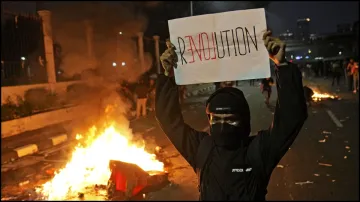Jakarta: Indonesia's Parliament has dropped a controversial law that introduced changes to electoral laws on Thursday after thousands of people stormed into the Parliament to protest against the legislation, setting fires and facing tear gas and water cannons. Critics of the law argued that the legislation would weaken the opponents of outgoing President Joko Widodo and his successor Prabowo Subianto.
The Indonesian legislature, dominated by Widodo's supporters, was scheduled to vote to overturn changes to election laws made by the constitutional court on election procedures, a ruling that effectively reopened a chance for Subianto's rival Anies Baswedan, a vocal government critic, to run in regional elections.
“It was stated that the revision of the regional election law cannot be implemented. This means that today the revision of the regional election law will not be implemented,” Deputy Speaker Sufmi Dasco Ahmad told reporters in Jakarta. Protesters occupied roads in front of the building. Some held banners and signs, while others started a fire and burned tyres.
What was the controversy?
Thousands of protesters gathered outside the Indonesian Parliament to protest against the move to reverse the court ruling, carrying signs accusing Widodo, widely known as "Jokowi", of nepotism and destroying democracy. Some even carried a mock guillotine carrying his face. Analysts described the protests as a sign of mounting anger towards Widodo's attempts to consolidate power.
Security forces fired tear gas and water cannon as protesters breached and set ablaze part of the gates of parliament, while demonstrations broke out across the country against the election law changes.
On Tuesday, the Constitutional Court lowered the threshold for the backing of parties for a candidate to contest the regional elections from 20 to 10 per cent of seats, giving Anies a chance to be nominated by the only party that has not named a candidate, the Indonesian Democratic Party of Struggle (PDIP), in the local parliament. The national parliament had sought to return to the previous threshold, contradicting the court's verdict.
The court also dismissed a challenge to an age limit that prevents people under 30 from running for regional governorships, which would prevent Widodo's youngest son, Kaesang Pangarep, 29, from running in a regional contest in Central Java. The Parliament passed an emergency motion to change the minimum age to serve as governor to 30 and had planned to ratify the change on Thursday.
Judiciary vs Legislature in Indonesia
The protests were sparked by a battle over which branch of government has ultimate jurisdiction in determining election rules, after the parliament had said it planned to ratify changes to the law on Thursday morning. Legal experts had warned of constitutional crisis emanating from the current stand-off between the parliament and the judiciary.
"This is a culmination, we have reached a tipping point of anger and frustration now," said Made Supriatma, a visiting fellow at the ISEAS - Yusof Ishak Institute in Singapore. Last year, the constitutional court changed the eligibility rules for elections, allowing Widodo's eldest son Gibran Rakabuming Raka to successfully run for vice president. Gibran and Prabowo will be inaugurated on October 20.
The power struggle came after dramatic political developments in the world's third-largest democracy, including the surprise resignation of the head of the Golkar party, who was replaced on Wednesday with a Jokowi loyalist. Widodo's tenure has ended with a stronger economic record but mired in corruption and patronage politics.
(with input from agencies)
ALSO READ | Indonesian mother, who goes out to bring medicines for her ailing son, swallowed by giant python
Latest World News
